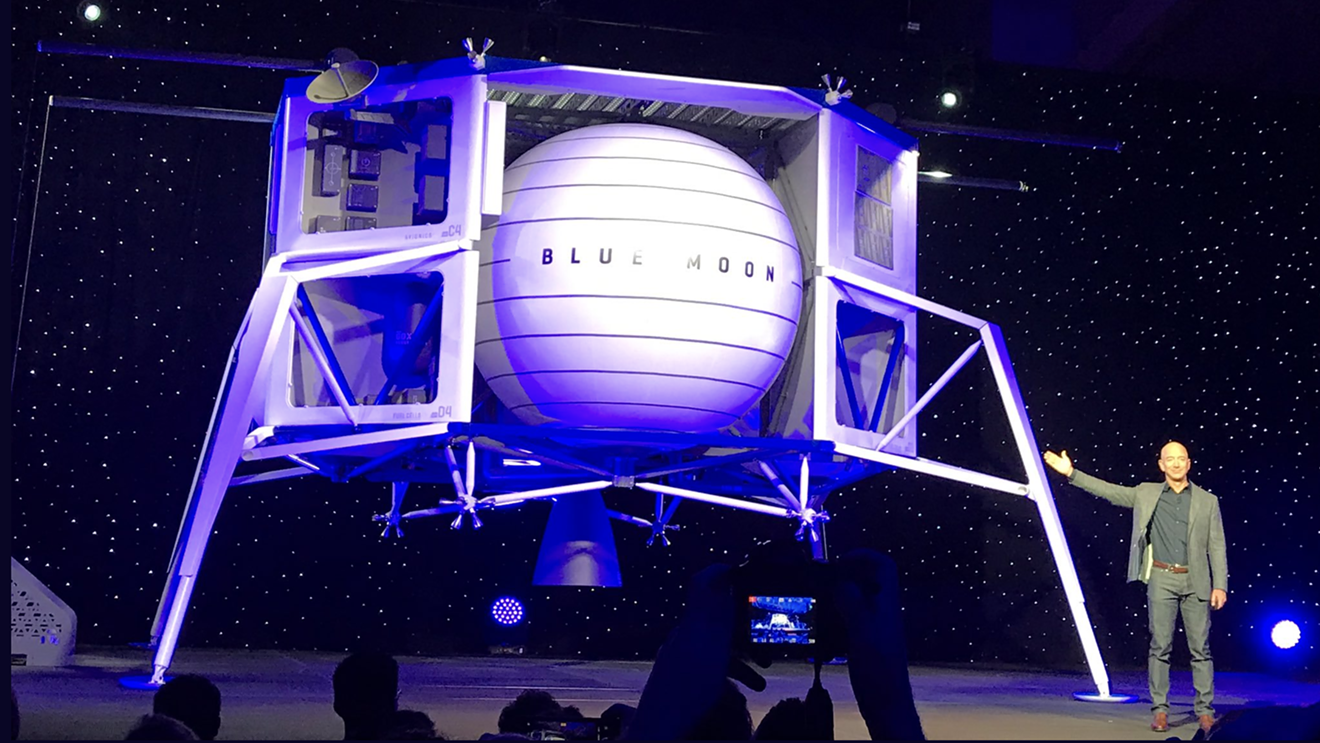Arizona State University and Jeff Bezos' Blue Origin company claim they'll put a payload on the moon by 2024.
But they can't even release the payload contract they signed after two months.
The lengthy delay to release a basic public record is somewhat ironic for both ASU, home to the Walter Cronkite School of Journalism and Mass Communication, and Bezos, owner of the Washington Post.
Bezos' company ignored several emails and calls from Phoenix New Times about the document.
Back on May 9, the announcement that Arizona State University and Blue Origin had signed a deal to provide transportation of payloads to the moon received international headlines. The memorandum of understanding (MOU) signed by the parties makes ASU a "customer" of Blue Origin, according to Bezos.
The Amazon.com founder unveiled the moon lander at an event in Washington, D.C., while painting the picture of a sci-fi future involving millions of humans living and working in space stations and on the moon. In a graphic displayed at the event, ASU's name was on a list of payload customers along with Airbus, the Massachusetts Institute of Technology, and various aerospace companies.
In a news release that day, ASU indicated the memorandum commits the university to "develop one or more payload experiments to be launched aboard Blue Origin’s Blue Moon, a flexible lander delivering a wide variety of small, medium, and large payloads to the lunar surface."
Officials later told New Times that ASU has no budget in place for any payload mission, and that the funding for such a project — which is likely to cost millions of dollars — would probably come from private or government sources.
New Times asked ASU to provide a copy of the document on May 13.
Skip Derra, an ASU spokesperson, said at the time that ASU was "eager to disclose the MOU."
"We’re just confirming with Blue Origin that there is no Blue Origin confidential information in the MOU that we would have to redact, per [state law]," he said.
Derra cited ARS 15-1640, which provides for several exemptions in public records law for state universities. The law allows universities to withhold the release of documents if they "would be contrary to the best interests of this state." It also allows contracts between universities and third parties to be withheld from public view if it can be demonstrated that they contain "confidential" information.
In late June, Derra said that ASU's Office of General Counsel was still having conversations with Blue Origin about the memorandum of understanding. In theory, ASU could provide the public with a redacted version of the memorandum; it has not done that, either, despite state law that demands public records be turned over "promptly."
ASU, not Blue Origin, is responsible for turning over the document. However, state law is unclear on how long ASU can continue to withhold a public document under 15-1640 if Blue Origin's lawyers don't cooperate in figuring out what, if anything, in the document is confidential.
"Generally, under the public records law, you need to respond in a prompt manner," said Danee Garone, a staff attorney for the state ombudsman's office who specializes in public records. "The problem is what if the company drags its feet for four or five months — what does that mean for ASU?"
Ultimately, if ASU refuses to release the memorandum, the question of when and how ASU should respond could be decided by a judge, he said.
Arizona public records law, enshrined under ARS 39-121, allows people to file a special action in superior court when their records request is denied. But special actions are expensive, and the contents of the memorandum may or may not be newsworthy.
For now, New Times will rely on Jeff Bezos' and ASU's spirit of public-records transparency. And so, we — and you — will wait a little longer.
While the lawyers at Blue Origin and ASU may need a productivity boost, the company hasn't been totally slacking in recent weeks: In late June, it test-fired a new engine for the Blue Moon lander. The rocket burned for about 35 seconds as scientists examined it for defects, but will need six minutes of thrust to land on the moon, according to a CNN article.
New Times will update this article and publish the memorandum if and when ASU releases it.
[
{
"name": "Air - MediumRectangle - Inline Content - Mobile Display Size",
"component": "18478561",
"insertPoint": "2",
"requiredCountToDisplay": "2"
},{
"name": "Editor Picks",
"component": "16759093",
"insertPoint": "4",
"requiredCountToDisplay": "1"
},{
"name": "Inline Links",
"component": "17980324",
"insertPoint": "8th",
"startingPoint": 8,
"requiredCountToDisplay": "7",
"maxInsertions": 25
},{
"name": "Air - MediumRectangle - Combo - Inline Content",
"component": "16759092",
"insertPoint": "8th",
"startingPoint": 8,
"requiredCountToDisplay": "7",
"maxInsertions": 25
},{
"name": "Inline Links",
"component": "17980324",
"insertPoint": "8th",
"startingPoint": 12,
"requiredCountToDisplay": "11",
"maxInsertions": 24
},{
"name": "Air - Leaderboard Tower - Combo - Inline Content",
"component": "16759094",
"insertPoint": "8th",
"startingPoint": 12,
"requiredCountToDisplay": "11",
"maxInsertions": 24
}
]












